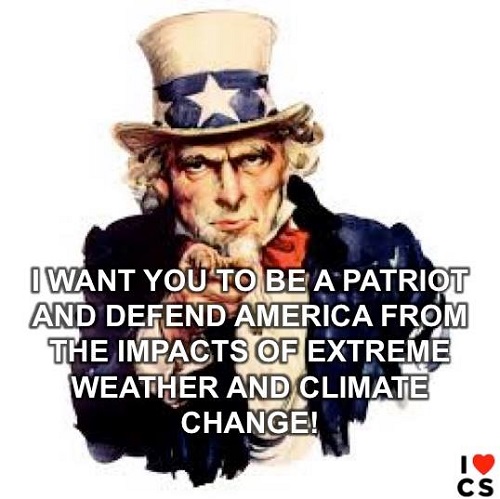2014 SkS Weekly Digest #27
Posted on 6 July 2014 by John Hartz
SkS Highlights
Mercury Rising: 2014 Sees Warmest May Ever Recorded Following on From 2nd Warmest April by Rob Painting attracted the highest number of comments of the articles posted on SkS during the past week. Drawing the second highest number of comments was Today’s Solar Power ‘Revolution’: Powerful Insights from Energy Experts, re-posted from Yale Climate Connections by greenman3610.
El Niño Watch
- Great Barrier Reef's coral faces ravaging by expected El Niño by Oliver Milman, the Guardian, July 4, 2014
- Weather patterns falling in line with El Nino forecast by Cassie Hough, ABC (Australia), July 2, 2014
Toon of the Week

h/t to I heart Climate Scientists
Quote of the Week
"Over the years, scientific findings on climate change have built to the point where we simply cannot afford to ignore them. And this is true no matter what your politics might be. The climate doesn’t care about politics."
Climate change threatens national security by David W. Titley, Pittsburgh Post-Gazette, July 5, 2014
David Titley is a retired rear admiral who directs the Center for Solutions to Weather and Climate Risk at Penn State (wxcrisk@gmail.com). He served in the Navy for 32 years and was the Navy oceanographer and navigator from 2009 to 2012.
SkS in the News
Quantifying the consensus on anthropogenic global warming in the scientific literature, Cook et al, 2013, Environmental Research Letters, is referenced in the following articles:
- Evolution, climate change share a lot, Op-ed by Mark Hohmeister, Talahassee Democrat, July 3, 2014
- Second coming of Nigel Lawson: The former Chancellor on fracking, global warming and why David Cameron has blown it in Europe by Jane Meerick, The Independent. June 29, 2014
SkS Spotlights
The Institute of Climate Studies, USA (ICSUSA.org)'s mission is to gather (scientific) data on climate parameters and to present this information in a manner which facilitates an understanding of this complicated issue by the general public.
The goals of the ICSUSA are to:
- Develop, compile and interpret climate change information to help bring about societal understanding.
- Develop public awareness of the issue and request that it be addressed by our elected leaders.
- Participate in defining a new, sustainable local economy.
- Link State Energy Agencies with Chambers of Commerce, building professionals, and citizens.
- Utilize existing data, and report new data as needed, to help bring about changes in perception, attitudes, and understanding that result in action.
Poster of the Week

SkS Week in Review
- Today’s Solar Power ‘Revolution’: Powerful Insights from Energy Experts by greenman3610
- What really annoys scientists about the state of the climate change debate? by Guest Author
- 'Reform conservatism' is not enough reform on global warming by Dana
- Mercury Rising: 2014 Sees Warmest May Ever Recorded Following on From 2nd Warmest April by Rob Painting
- Global warming makes drought come on earlier, faster, and harder by John Abraham
Coming Soon on SkS
- Nigel Lawson suggests he's not a sceptic, proceeds to deny global warming (Dana)
- New Jersey science education standards may be blocked by climate contrarians (Howard Lee)
- Ancient ocean currents may have changed pace and intensity of ice ages (NSF Press Release)
- State Department cuts through the acid political environment on oceans and climate (Sarah)
- Mitigating Climate Change: Kangaroos, conservation management and sustainable harvesting at NMIT? (Climate Citizen Guest Post)
Mother Nature Always Bats Last!
- Coastal winds intensifying with climate change, Phys.org, July 4, 2014
- Nearly 80% of California now under 'extreme' drought conditions by Veronica Rocha, Los Angeles Times, July 3, 2014































 Arguments
Arguments






























In addition to the recent study by Matt England from USNW, which discussed the link between strenghtening trde winds and ocean warming, now we have another study from UNSW, by Paul Spence, also co-authored by Matt:
Rapid subsurface warming and circulation changes of Antarctic coastal waters by poleward shifting winds
which discusses the antarctic surface water warming as the result of strenghteting circumpolar winds. The bad news from this latest study is: the WAIS melt rate will be revised upwarda when the results of this study are incorporated into melting models. Extra sea water warming that exceeds 2 °C is darn lot.
Also available (at least for me in Aus) are: the smh press release and full text from smh
Thanks, chris. Those are also covered at http://climatestate.com/2014/07/07/new-mechanism-uncovered-causing-potentially-rapid-antarctic-glacier-melt/. So what _will_ the new upward-revised melt rate be for WAIS given this study? How much more and faster will slr go up even than the already upward-revised sea-level-rise from the earlier studies this year? Is a meter rise before mid-century starting to look more probable? What about the ranges for the end of the century? Is anyone putting all these new findings together to come up with a new range of probable slr rates?